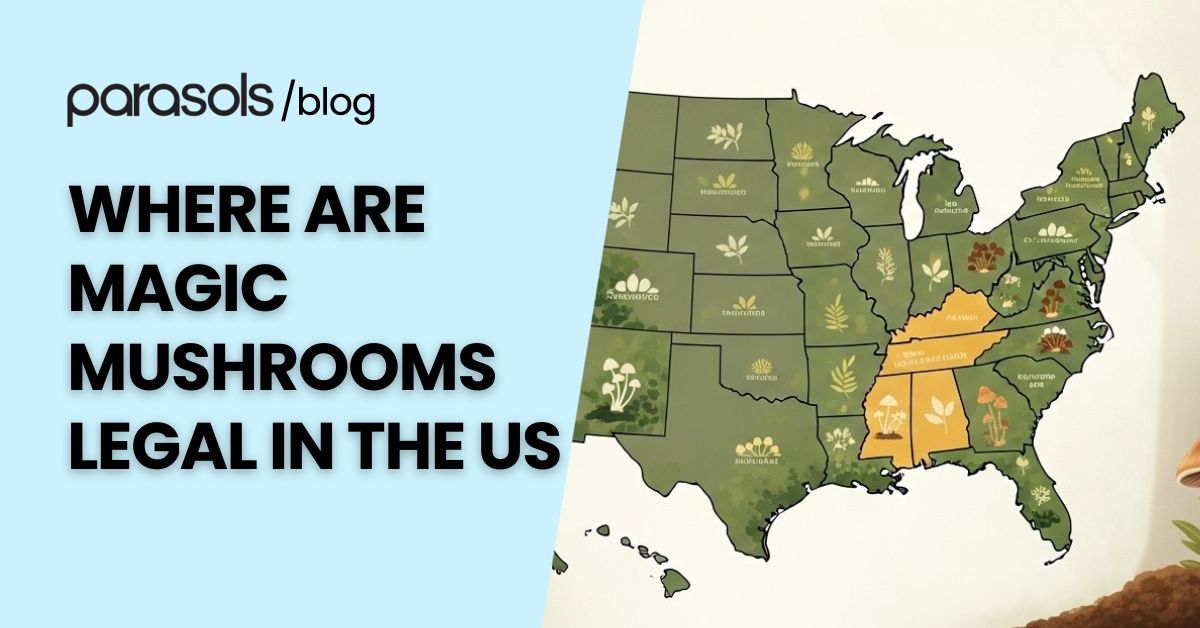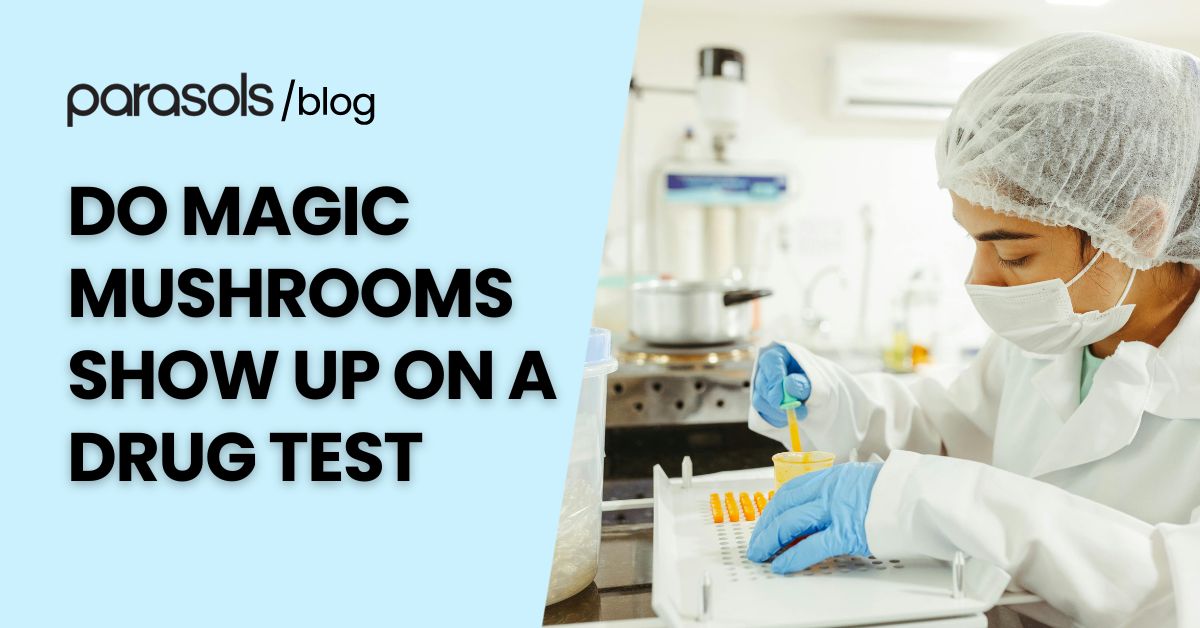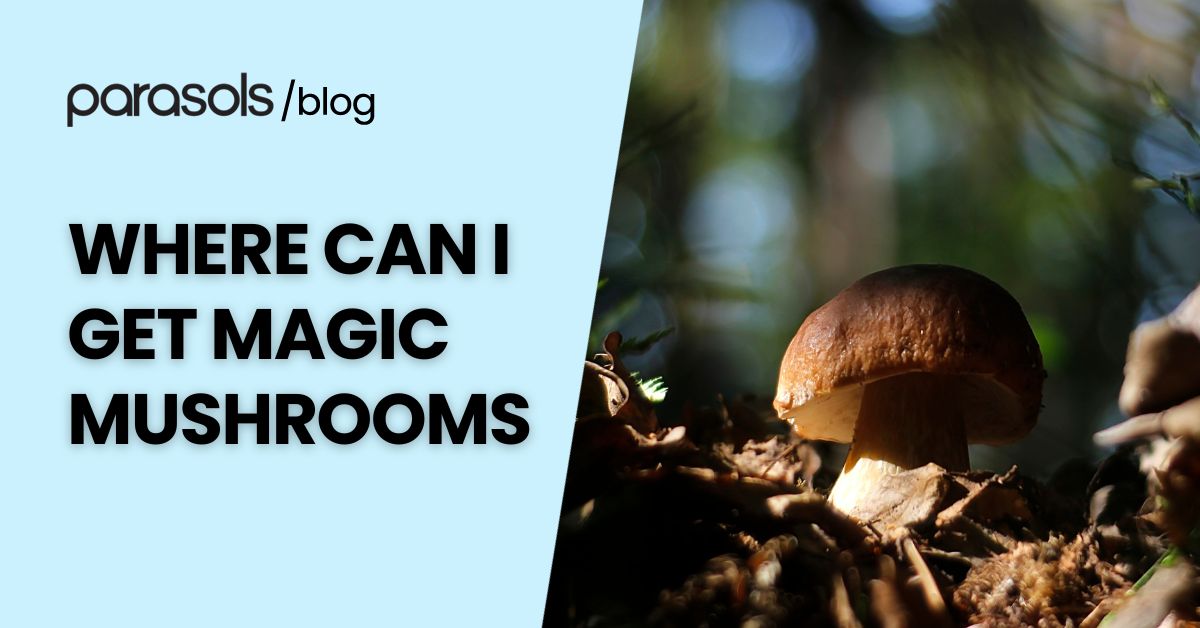Curiosity around magic mushrooms has grown beyond whispers at music festivals — today, it’s part of a bigger conversation about healing, mental health, and the boundaries of modern medicine. As more states rethink old drug laws, people are asking a simple question: where are magic mushrooms legal in the US, and what does that really mean for those learning their therapeutic potential?
Key Takeaways
- Magic mushrooms are only legally accessible in a few U.S. states under regulated or medical programs
- Oregon allows supervised psilocybin use in licensed service centers through Measure 109
- Colorado decriminalized possession and home cultivation under Proposition 122 and permits regulated healing centers
- New Mexico legalized medical psilocybin use through the Medical Psilocybin Act
- Several cities — including Denver, Oakland, Santa Cruz, and Washington, D.C. — have decriminalized psilocybin
- Despite state-level reforms, psilocybin remains a Schedule I controlled substance under federal law
Where are Magic Mushrooms Legal in the US?

Curiosity around magic mushrooms has grown beyond whispers at music festivals. Today, they’re part of a larger conversation about healing, mental health, and the boundaries of modern medicine. As more states revisit old drug laws, people are asking: where are magic mushrooms legal in the US, and what does that really mean?
Oregon
Oregon was the first state to create a regulated program for psilocybin. In 2020, voters approved Measure 109, allowing adults 21 and older to receive psilocybin in licensed service centers under professional supervision. Although psilocybin remains a controlled substance under federal law, Oregon’s program focuses on therapeutic use for mental health treatment, not recreational consumption. In simple terms, you can’t just buy or grow magic mushrooms at home, but you can access them in licensed settings for guided therapy.
Colorado
Colorado followed Oregon’s lead in 2022 when voters approved Proposition 122. The measure decriminalized personal possession, cultivation, and sharing of psilocybin, and it opened the door for regulated “healing centers.” Adults 21 and older can grow or possess psilocybin for personal use, though selling it commercially remains tightly controlled. These healing centers are designed to offer psilocybin-assisted therapy in a safe and supportive environment.
New Mexico
New Mexico recently passed the Medical Psilocybin Act, allowing people with qualifying medical conditions to access psilocybin under the supervision of licensed providers. This law focuses on medical and therapeutic use rather than full recreational legalization, marking an important step toward recognizing psilocybin’s potential benefits for mental health.
Cities and Localities with Decriminalization
Several US cities have also moved to decriminalize magic mushrooms, making enforcement of psilocybin laws a lowest law enforcement priority rather than fully legalizing them.
- Denver, Colorado — the first major city to decriminalize psilocybin in 2019.
- Oakland and Santa Cruz, California — both decriminalized entheogenic plants and fungi, including magic mushrooms.
- Washington, D.C. — passed Initiative 81, which made adult use of certain natural psychedelics the lowest enforcement priority.
Decriminalization doesn’t mean full legalization. It simply reduces the risk of prosecution for personal possession or cultivation.
Federal Law and What Remains Illegal
At the federal level, psilocybin and psilocin are still classified as Schedule I controlled substances under the Controlled Substances Act. This means possessing, selling, or cultivating psilocybin mushrooms remains illegal across the country unless it’s part of approved research or medical programs. Even as state laws develop, federal law continues to classify psilocybin as an illicit drug in the same category as other hallucinogenic substances.
Benefits of Taking Magic Mushrooms
Many people aren’t just curious about magic mushrooms for their mind-bending experiences. What’s drawing attention today is their potential to heal. As studies grow and more people share personal stories, the therapeutic benefits of psilocybin mushrooms are becoming hard to ignore.
Mental Health Treatment
Psilocybin shows real promise for mental health treatment. In clinical settings, it has helped people struggling with depression, anxiety, and PTSD by offering new perspectives and emotional release. Researchers believe psilocybin-assisted therapy works by “resetting” brain activity patterns, helping patients process painful emotions in a safe, guided environment. Many describe it as years of therapy condensed into a few deeply introspective sessions.
Therapeutic Use and Emotional Healing
Psilocybin-assisted therapy allows patients to experience difficult emotions with compassion and understanding. Under professional guidance, people often gain clarity about relationships, self-worth, and life purpose. The experience can encourage forgiveness, reduce emotional avoidance, and support long-term healing—making psilocybin a breakthrough therapy for emotional resilience and trauma recovery.
Overcoming Addiction and Negative Patterns
Emerging research shows psilocybin’s potential to reduce dependence on substances such as alcohol and nicotine. By interrupting rigid patterns in the brain, psilocybin can help people step outside destructive habits and build healthier coping mechanisms. This isn’t about escaping reality—it’s about reconnecting with it in a clearer, more mindful way.
Boosting Mindfulness and Well-Being
Even outside of clinical settings, users often report enhanced creativity, spiritual awareness, and a stronger sense of connection to nature and others. These effects—when guided responsibly—can improve overall well-being, reduce anxiety, and promote empathy. Psilocybin encourages living in the moment, reminding many people of what truly matters in their lives.
The Promise of Psychedelic Medicine
As natural psychedelics gain scientific recognition, researchers continue to learn their role in psychedelic treatments for a range of mental health challenges. While psilocybin remains a controlled substance under federal law, ongoing studies highlight its medicinal potential and therapeutic benefits. With careful guidance and regulation, psychedelic medicines could reshape how we think about healing in the coming decade.
Popular Magic Mushroom Alternatives
If psilocybin mushrooms aren’t available where you live—or you’re simply curious about other ways to study natural psychedelics—there are several alternatives people turn to for similar introspective or therapeutic effects.
- Ayahuasca — A traditional Amazonian brew containing DMT. It’s often used in guided ceremonies to promote deep emotional healing and spiritual insight. Ayahuasca remains illegal in most of the U.S. but is permitted in a few religious contexts.
- Peyote and San Pedro — These cacti contain mescaline, a hallucinogenic compound that produces vivid visual and emotional experiences. They hold cultural and spiritual importance in Indigenous traditions and are legal only for ceremonial use by recognized Native American groups.
- LSD (Lysergic Acid Diethylamide) — A synthetic psychedelic known for its powerful mind-altering effects. Though still illegal under federal law, LSD has been studied for its potential in treating depression, addiction, and PTSD.
- Ketamine — Originally an anesthetic, ketamine is now used in clinical settings to treat severe depression and anxiety. While it’s not a natural psychedelic, ketamine-assisted therapy has become a legal, regulated option for many seeking relief.
- DMT (Dimethyltryptamine) — A naturally occurring hallucinogen found in various plants and animals. It induces intense, short-lasting experiences and is often referred to as “the spirit molecule.” DMT remains a controlled substance under U.S. law.
- Lion’s Mane Mushroom — Unlike hallucinogenic mushrooms, Lion’s Mane doesn’t cause psychedelic effects. Instead, it supports brain health and cognitive function, often used as a natural nootropic for focus and memory enhancement.
Final Thoughts

The conversation around magic mushrooms is shifting fast. What was once dismissed as an illicit drug is now being studied for its profound therapeutic and emotional benefits. As more states study decriminalization and medical use, it’s clear that psilocybin—and other natural psychedelics—hold real potential for mental health treatment and personal healing.
If you’re curious about where this movement is heading next, learn more about how psychedelic therapies are changing mental health care today.
Frequently Asked Questions
Are magic mushrooms safe to use?
When taken responsibly and under guidance, psilocybin mushrooms are generally considered safe for most healthy adults. Still, they can trigger intense emotional or psychological effects, so they’re not suitable for everyone—especially those with a history of psychosis or certain mental health conditions.
Can I grow magic mushrooms at home?
In most of the U.S., growing psilocybin mushrooms is still illegal. Some cities that have decriminalized personal possession treat small-scale cultivation as a low law enforcement priority, but it remains prohibited under federal law.
Do magic mushrooms show up on drug tests?
Typical workplace or legal drug tests don’t screen for psilocybin. However, specialized tests can detect it within one to two days after use, depending on factors like dose and metabolism.
How long do the effects of psilocybin last?
The main effects usually last four to six hours, but personal insights and emotional clarity from the experience can linger for days or even weeks.
Can psilocybin help with physical health issues?
Most research focuses on mental health treatment, but early studies suggest psilocybin could influence pain perception and inflammation. More research is needed before it’s considered for medical use in physical conditions.
Is microdosing magic mushrooms legal?
Microdosing—taking very small, sub-perceptual doses of psilocybin—remains illegal under federal law. Still, many people learn it in areas where psilocybin has been decriminalized, often for creativity or mood enhancement.
What’s the difference between psilocybin and other psychedelics like LSD or DMT?
Psilocybin comes from natural mushrooms, while LSD and DMT are synthetic or plant-based in different ways. Psilocybin is known for gentler, introspective effects, whereas LSD and DMT tend to produce longer or more intense psychedelic experiences



Leave a comment
All comments are moderated before being published.
This site is protected by hCaptcha and the hCaptcha Privacy Policy and Terms of Service apply.